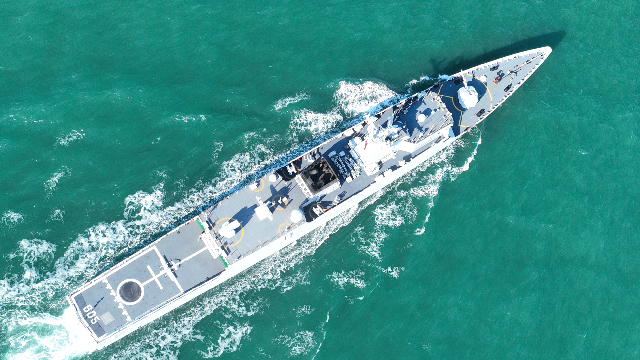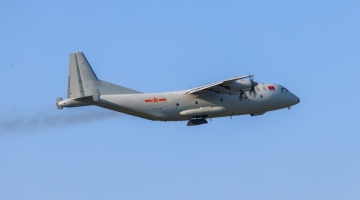By Jiao Jian
Recently, the United States Department of State issued a joint statement on the US-Japan-ROK Indo-Pacific Trilateral Dialogue where they expressed "concern" over the situation in the South China Sea and stated to continue to conduct trilateral maritime security and law enforcement cooperation in accordance with international law. They also reaffirmed "the importance of peace and stability across the Taiwan Strait as indispensable to security and prosperity in the international community."
This joint statement of the triplex reflects their concerns about China's rise and contest for regional influence. In recent years, the US, together with Japan and the ROK, had cobbled together exclusive small cliques in the name of cooperation to blatantly meddle in China's internal affairs and provoke aggressive, defamatory, and hostile actions against China, in an attempt to contain China's influence through diplomatic and military means. However, such a move ignores a basic fact, that is, both the South China Sea issue and the Taiwan question belong to China's internal affairs, and any interference by external forces is a violation of China's sovereignty.
The disputes or divergences around the South China Sea are between China and the countries concerned, and brook no intervening from any third party. Recently, the US has been meddling in the South China Sea issue for its own selfish interests, showcasing military strength and instigating chaos in this region under the cover of freedom of navigation, and brazenly provoking China through repeated joint military exercises with the Philippines. China always advocates peaceful settlement of territorial and maritime delimitation disputes with countries directly concerned through negotiations on the basis of respecting historical facts and upholding international law. Meanwhile, China also stresses the fact that it has indisputable sovereignty over the Nansha Qundao and their adjacent waters. China's position and proposition on the South China Sea issue is based on a solid historical and legal foundation. China has consistently maintained its stance without altering the relevant basis or extending the scope, and has never been involved in any undue claims.
Over the years, China and ASEAN countries have been sticking to properly solving their differences through bilateral consultations and negotiations in accordance with the Declaration on the Conduct of Parties in the South China Sea, thus jointly maintaining overall stability in the South China Sea and securing themselves a steady environment for development and revitalization. The improper involvement and frequent disturbance from the major powers outside the region are just the most significant risks currently impacting peace and stability in the South China Sea. The "concerns" expressed by the US, Japan, and the ROK are totally groundless in whatever respect.
The Taiwan Strait during the eight years under Tsai Ing-wen's administration has seen a severe regression in cross-strait relations and a situation mired in upheaval and intricately intertwined with the ever-evolving global and regional landscape. The newly elected leaders of the Taiwan region will cast a crucial impact on the future of Taiwan, cross-strait relations, the regional situation, and even the global pattern. The joint statement issued by the US, Japan, and the ROK on the occasion of the Taiwan leadership election emanates strong indications of intervention. However, this will only gravely jeopardize the peace and stability across the Taiwan Strait, push the island to the brink of war, and incur profound calamity to the common Taiwan compatriots.
Since taking office in early 2021, Biden has identified China as "the most serious competitor" and relentlessly demonstrated a tough stance toward China. In his first foreign policy speech, Biden had said the US would compete with its opponents by strengthening cooperation with its allies. The Biden administration's prioritizing on reinforcing coordination and cooperation with its allies is nominally to repair their mutual relations disrupted by the Trump doctrine, but fundamentally to facilitate containing China and maintaining its hegemony at low costs by leveraging its allies. The fact that the US courts its allies and accelerates building small cliques against China clearly manifests the decline of US hegemony and the US failure to halt the progress of China solely by its own strength.
To comprehensively contain China and maintain its hegemony, the US has taken continuous actions to restrain China. By upholding the Cold War mentality, hegemonic logic, and bloc politics, the US gathered its allies and formed closed and exclusive small cliques including the Five Eyes, the QUAD, and the AUKUS, forcing regional countries to take sides. The US had propelled NATO to intervene in the Asia-Pacific affairs and release a new version of the Strategic Concept document, hyped up the so-called China threat, and invited its Asian allies including Japan and the ROK to participate in the NATO summit in an attempt to establish an Asia-Pacific version of NATO, seriously threatening the security and stability of this region. The Asia-Pacific region serves as the focal point for the US' strategic rivalry against China, and thus naturally has also emerged as the most concentrated hub for its clustering of closed clubs against China.
However, the US, Japan, and the ROK must eventually understand that the Asia-Pacific region is a high ground for peaceful development rather than a chess board for major power gaming. We hope that the US earnestly respects the regional countries' efforts to maintain peace and stability, abandon the Cold War mentality, and stop creating bloc confrontation and aggravating regional tensions. We also hope Japan and the ROK not to arbitrarily join in the small cliques targeting China and degrade into the "cannon fodder" of the US endeavor to contain China's rise and its anti-China bridgehead in the Asia-Pacific region.
The author is a lecturer at the Center for Asian Studies of Institute for International Strategic Studies, Party School of the Central Committee of CPC (National Academy of Governance.)
Editor's note: Originally published on china.com.cn, this article is translated from Chinese into English and edited by the China Military Online. The information and opinions in this article do not necessarily reflect the views of eng.chinamil.com.cn.









